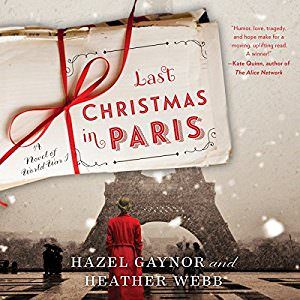 Narrated by Alex Wyndham, Billie Fulford-Brown, Morag Sims, Gary Furlong, Derek Perkins, Greg Wagland, Antony Ferguson, Jane Copland and Mary Jane Wells
Narrated by Alex Wyndham, Billie Fulford-Brown, Morag Sims, Gary Furlong, Derek Perkins, Greg Wagland, Antony Ferguson, Jane Copland and Mary Jane Wells
Last Christmas in Paris is a beautifully written, superbly narrated epistolary novel which centres around the correspondence exchanged between three friends during the years of the First World War. I suspect the degree to which any listener will enjoy the story will depend on whether one enjoys novels that consist entirely of letters; personally, I’m a big fan of that literary device, so that, added to the fact that I have a particular interest in the history of the period, plus the list of excellent narrators attached to the project pretty much ensured my enjoyment of this audiobook. And enjoy it I did, although ‘enjoy’ seems rather a feeble word to describe how I feel about it now that I’ve finished listening to it. I was so caught up in this story of friendship, emancipation, love, loss, tragedy, hope, despair… a real gamut of emotions, that I couldn’t bear to set it aside; I listened to it in only two or three sittings and, when I finished it, felt that strange sense of emptiness that always seems to descend when I’ve finished reading or listening to something really good – that feeling of “what do I do now?”
It’s Christmas 1968 and the elderly and infirm Thomas Harding is on his way to Paris, taking with him the bundles of letters written by himself and his dearest friends during the years 1914 to 1918, finally ready to re-read them in response to the dying wish of someone who was clearly very important to him. There is also one last, sealed letter – To be opened in Paris on Christmas Eve – which has him wondering “what more she might have to say.”
The novel is split into sections, one for each year of the war, and each ends with observations and reflections from the older Thomas, who is clearly very unwell. We open in 1914, just one week after the outbreak of war and learn that Thomas Harding and his best friend, Will Elliot, have joined up and are currently at a training base in Oxford, from whence they will eventually ship out for France. Will’s sister, Evelyn (Evie) writes to both Thomas and her brother; Thomas very soon proves to be the better correspondent, and thus begins an exchange of letters – information, ideas, and sentiments – that will last for the duration of the war.
Their early letters are filled with the kinds of hope and patriotic naïveté typical of those early days of the war, when everyone believed it would all be over by Christmas, and were cheering on the brave boys who were going to be the instruments of many a glorious victory that would prove once and for all that might is right. Evie excitedly writes of their oft talked of plans to spend Christmas in Paris with her friend Alice (who is sweet on Will) making up a fourth. But of course, such a trip is destined not to be.
The novel encompasses several different, interweaving plotlines, the foremost of which is the love story of Thomas and Evie, which is very well done; one so often bemoans the lack of showing and abundance of telling in romances that it’s a wonderfully refreshing change when that is reversed and, as happens here, we get to hear the couple falling in love (even though they don’t realise it) as they exchange the details of their daily lives and open up to each other, pouring out their thoughts onto paper and telling each other things that they have never told another living soul. As the horrors of war and the constant, senseless losses begin to take their toll, Evie’s letters and her unconditional, uncomplicated acceptance of whatever he wants to say, become Thomas’ lifeline.
The world at home is changing, too. Evie and Alice are clearly both privileged young women, born to a class that expects them to marry well and be good, dutiful wives, but they find it impossible to sit quietly at home amid such tumultuous change and Alice soon joins the nursing corps, while Evie gets a job delivering the post near her home in Richmond, something her mother bemoans frequently, embarrassed that her daughter is doing something as vulgar as working. At the same time, Evie has started to write a column for the London Daily Times, the newspaper owned and run by Thomas’ father, and, in 1917, joins the newly formed WAAC (Women’s Auxiliary Army Corps) so she can travel to France and write her columns from there.
The novel is full of interesting historical detail, and the way in which the authors gradually move the tone of the letters from the initial light-hearted, bantering jocularity to something altogether more sombre is masterful. While I’m not normally a fan of first person narration because I like to have differing points of view, when it comes to epistolary novels I’m more tolerant of it, and here the authors use it to great effect, creating a real sense of connection to the characters through the intimacy of letter-writing. As Evie points out, it’s easier somehow, to pour one’s heart out on paper than it is to confess to the same feelings face-to-face.
I loved every bit of Last Christmas in Paris, although I do have a couple of issues with the pacing that caused me to knock half-a-point from my final content grade. Firstly, we spend a lot of time in the early part of the war, from 1914-16 and not so long in the final two, so the years 1917-18 feel rather truncated, and secondly – most importantly – we spend something like four years listening to Thomas and Evie fall in love, but the payoff is rushed. Neither of these things really spoiled my overall enjoyment – although I can’t deny I’d have liked to have spent a little time with happy-Thomas-and-Evie – and it was only when I was preparing to write this review that I actually realised those deficiencies.
Another reason I pounced on this audiobook so eagerly was the stellar list of narrators attached to it. I’ve listened to all but two of them before, so was easily able to identify who was voicing which character (there is no cast list included) and while most of the heavy lifting is done by Alex Wyndham as Thomas and Billie Fulford-Brown and Morag Sims as Evie and Alice respectively, everyone involved does a splendid job with the various other smaller roles they are given: Gary Furlong as Will, Antony Ferguson as John Hopper, Mary Jane Wells as Delphine – sporting a beautifully realised French accent – Derek Perkins as John’s father, most of them also filling in other bit parts along the way.
Ms. Fulford-Brown and Ms. Sims portray their characters with aplomb, especially Morag Sims, whose slightly husky, buoyant tones are just perfect for the socialite Alice, a young woman of spirit and the determination to make a difference. Billie Fulford-Brown brings great heart to her portrayal of Evie as an intelligent, caring young woman caught between the life she had expected to live and the new one opening up before her. But – and I’m sure you knew I was going to say this – it’s Alex Wyndham who steals the show with his absolutely outstanding performance as Thomas. He portrays the older man by lowering the pitch of his voice, slowing his speech and adding a kind of gravelly tremor to his delivery; the weight of his years is as evident as the weight of his memories. As the younger man in the trenches watching friends and comrades die, knowing that there is no such thing as a ‘glorious victory’, battling the enemy as well as disease and disillusionment, Mr. Wyndham infuses Thomas’ words with such depth, such pain, such joy, such heartbreak… the emotion in his voice sometimes so raw that it almost hurt to listen to it, and he brought me to tears at least twice.
Last Christmas in Paris is a tremendous listen which pushed all the right buttons for yours truly in terms of the setting, the structure and the narration. If you’re not keen on stories told through correspondence, then it might not be the audiobook for you, but if you have an open mind, an interest in this period of history, or just love the narrators, I’d urge you to give it a try. I honestly don’t think you’ll regret it.
Caz
Buy Last Christmas in Paris by Hazel Gaynor and Heather Webb on Amazon




2 thoughts on “Last Christmas in Paris: A Novel of World War I by Hazel Gaynor and Heather Webb”
Comments are closed.